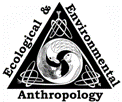Wildlife Damage Management, Internet Center for

Ecological and Environmental Anthropology (University of Georgia)
Date of this Version
2005
Abstract
Anthropology is at a crossroads; perhaps it always has been. Because it is such a broad discipline, there has always been debate among anthropologists over its role inside and outside of academia. There are often tensions between the paradigms of theory and practice, modernism and postmodernism, constructionism and deconstructionism, scaling up and scaling down, and many other seeming dichotomies that really contain many shades of gray. Anthropology has been called “the most humanistic of the sciences, and the most scientific of the humanities.” We anthropologists should take this phrase as a compliment, and each strive to find our own niche inside the discipline that sweeps across temporal, spatial, and social scales in a way that no other discipline does. At the same time, we should listen to and collaborate with experts in other fields, as well as non-experts with experiences different from our own, always vigilant of our own motives and biases.
The global community is also at a crossroads, due to stronger technological, financial, political, and social ties than ever before in history, and few would argue with the statement that the global environmental situation is precarious at best. Every day we lose species and ecosystems that might hold answers to perhaps the most basic questions of mankind: how does the earth work, how did the world come to be the way it is now, and what is the proper role of humans in this world? We are also losing, at an alarming rate, groups of people who have answers to these questions that are much different from our own, as well as questions other groups cannot even think to ask. The loss of cultural, linguistic, and biological diversity leaves us all poorer and more ignorant. To combat these problems, we anthropologists must examine the political processes behind biological and cultural extinctions; indeed, as Marvin Harris once said, “If it be anthropology to struggle against the mystification of the causes of inequality and exploitation, long live anthropology.”
Since every local problem resides within larger issues and even larger frameworks nested in still larger discourses, communication is vital. There is no time to reinvent the wheel; we should instead both stand on the shoulders of giants (as encouraged by Newton) and seek out the less traveled paths in life (as Frost suggests). Anthropology stresses the message that all events are contextual and that no idea or behavior exists in isolation.


Comments
Published in Ecological and Environmental Anthropology Vol. 1, No. 1, 2005. Copyright © 2005 Hitchner. Used by permission. Online at http://eea.anthro.uga.edu/index.php/eea/index